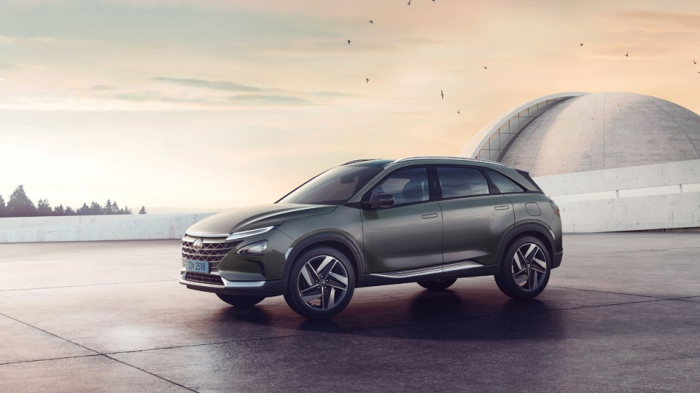Hydrogen economy
Hyundai seeks tech to produce clean hydrogen from food waste
Hyundai plans to work on system that produces 216 kg of clean hydrogen a day, enough to charge over 34 NEXO FCEVs
By Aug 29, 2023 (Gmt+09:00)
1
Min read
Most Read
LG Chem to sell water filter business to Glenwood PE for $692 million


Kyobo Life poised to buy Japan’s SBI Group-owned savings bank


KT&G eyes overseas M&A after rejecting activist fund's offer


StockX in merger talks with Naver’s online reseller Kream


Mirae Asset to be named Korea Post’s core real estate fund operator



Hyundai Motor Co., Kia Corp. – carmakers in the group – and their construction affiliate Hyundai Engineering & Construction Co. on Tuesday agreed with South Korea’s state-run Sudokwon Landfill Site Management Corp. on the joint development of eco-friendly hydrogen technology utilizing biogas and related businesses.
Biogas, a mixture of methane and carbon dioxide, is produced when microbes decompose organisms in oxygen-free environments. Fermentation of food waste usually generates biogas with methane as the main component, which can be refined to produce high-purity clean hydrogen.
Hyundai Motor controlled over half of the global market of the FCEV powered by hydrogen in the first quarter thanks to the popularity of the NEXO crossover.
DAILY PRODUCTION ENOUGH TO CHARGE 34 NEXO FCEVS
Hyundai Motor Group and Sudokwon Landfill Site Management plan to work on a system that manufactures 216 kilograms of eco-friendly hydrogen a day based on biogas produced by the state body, which handles waste generated in the greater Seoul area, over the next two years, according to the conglomerate.
The daily output is enough to charge more than 34 units of the NEXO FCEV.
The group aims to develop technology for electrofuels, by-products generated from clean hydrogen manufacturing process to apply them to internal combustion engine cars. It also plans to seek technology for eco-friendly plastic materials by synthesizing clean hydrogen and carbon monoxide.
“We will develop high value-added technologies including those for electrofuels and eco-friendly plastic interior materials in the future to lead the global carbon neutrality sector,” said Hong Seung-Hyun, Hyundai Motor’s head of materials research and engineering center.
Write to Sungsu Bae at baebae@hankyung.com
Jongwoo Cheon edited this article.
More to Read
-
 AutomobilesHyundai Motor posts largest share of global hydrogen car market in Q1
AutomobilesHyundai Motor posts largest share of global hydrogen car market in Q1May 12, 2023 (Gmt+09:00)
1 Min read -
 AutomobilesHyundai’s NEXO crossover tops world’s hydrogen vehicle market
AutomobilesHyundai’s NEXO crossover tops world’s hydrogen vehicle marketOct 11, 2022 (Gmt+09:00)
1 Min read
Comment 0
LOG IN


